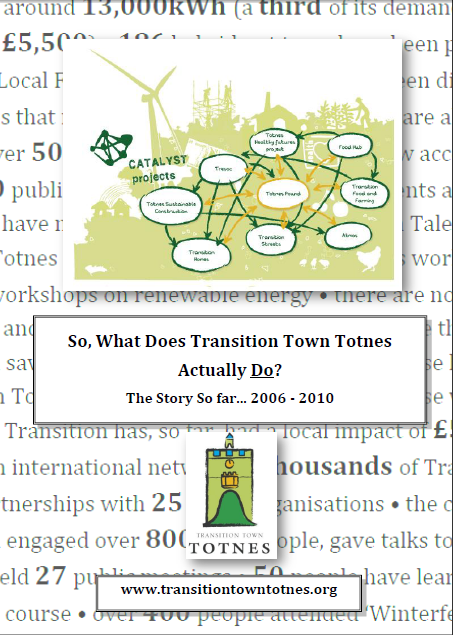23 Nov 2010
New Report: ‘So what does Transition Town Totnes actually do?’
 Transition Town Totnes has been running now for just over 4 years, and recently a group of us sat down to try and capture what has actually been achieved by the process. It has been a very illuminating process, one that is very useful to do in terms of being able to get a sense of what has actually been achieved on the ground (I highly recommend it). The name of the report, ‘So, what does Transition Town Totnes actually do?‘, comes from the question often asked by visitors to the town who come to see a Transition town, wander round the High Street and wonder why there are still cars and not windmills everywhere. This report is designed to explain all that is going on below the surface (as well as on top of it…).
Transition Town Totnes has been running now for just over 4 years, and recently a group of us sat down to try and capture what has actually been achieved by the process. It has been a very illuminating process, one that is very useful to do in terms of being able to get a sense of what has actually been achieved on the ground (I highly recommend it). The name of the report, ‘So, what does Transition Town Totnes actually do?‘, comes from the question often asked by visitors to the town who come to see a Transition town, wander round the High Street and wonder why there are still cars and not windmills everywhere. This report is designed to explain all that is going on below the surface (as well as on top of it…).
Copies of the report were distributed to the Town Council and last week I attended a meeting where I gave a brief presentation about it, following which the Councillors talked about how proud they were of TTT, and then unanimously passed a resolution supporting our work (here is a report from the local press). The resultant report can be downloaded here (it’s a big file, about 5.5MB). As TTT is a community organisation with no core funding, we are offering this report for free, but we hope that having read it you might feel inspired to make a donation to support our vital work:
michael Dunwell
25 Nov 8:03pm
A long time ago I challenged Rob to beat the creation of a technician job in a polytunnel we got for a school to teach practical growing skills. This must have stung him into action! OK Rob. You win.
But haven’t we come a long way?
Dave Dann
27 Nov 11:07am
This is a list of effort applied but the tourists and visitors were interested in visible results?
Susan
21 Dec 5:38pm
Out of all the things listed, only 3 are actually doing something directly: planting the nut trees, exchanging seeds at the Seedy Sunday, and, when it happens, acquiring the Dairy Crest site. Transition is mostly awareness-raising and education. It supports other groups actually doing physical things. Nothing wrong with that, although I was disappointed in my local group’s not doing anything on the ground.
What is Conservation: Norbury Park | escapingeggshells
22 May 4:08pm
[…] Transition Totnes have secured grants to bring a site into community ownership. Maybe there is an opportunity to do the same for Norbury Park, in collaboration with Surrey Wildlife Trust. There are several Transition groups across Mole Valley who could assist with raising awareness and discussions around possibilities. And also continuing to support Norbury Park Sawmill. Conservation is not just about animals and land, its about people and their local experience being passed through generations. […]